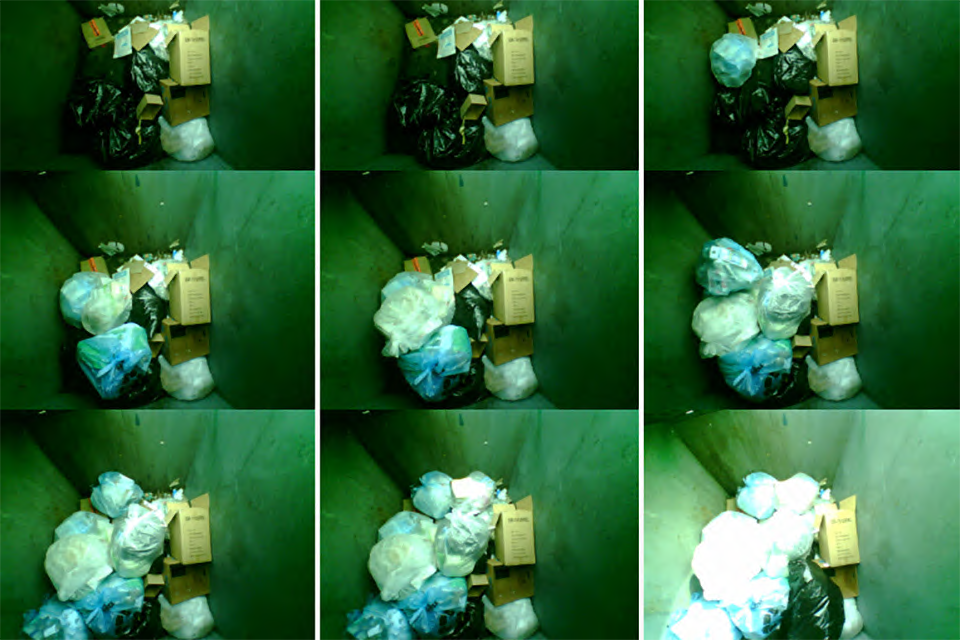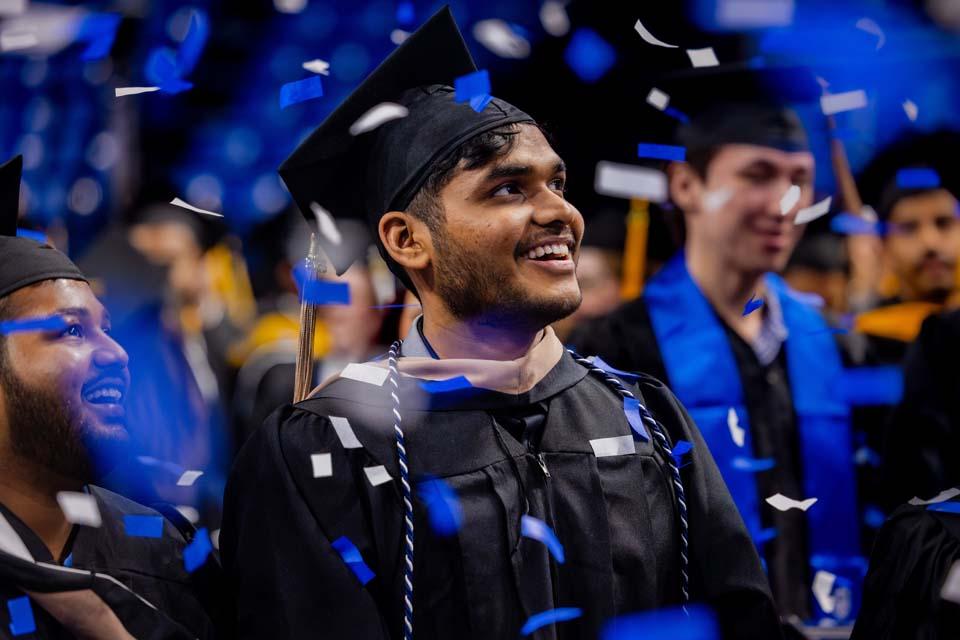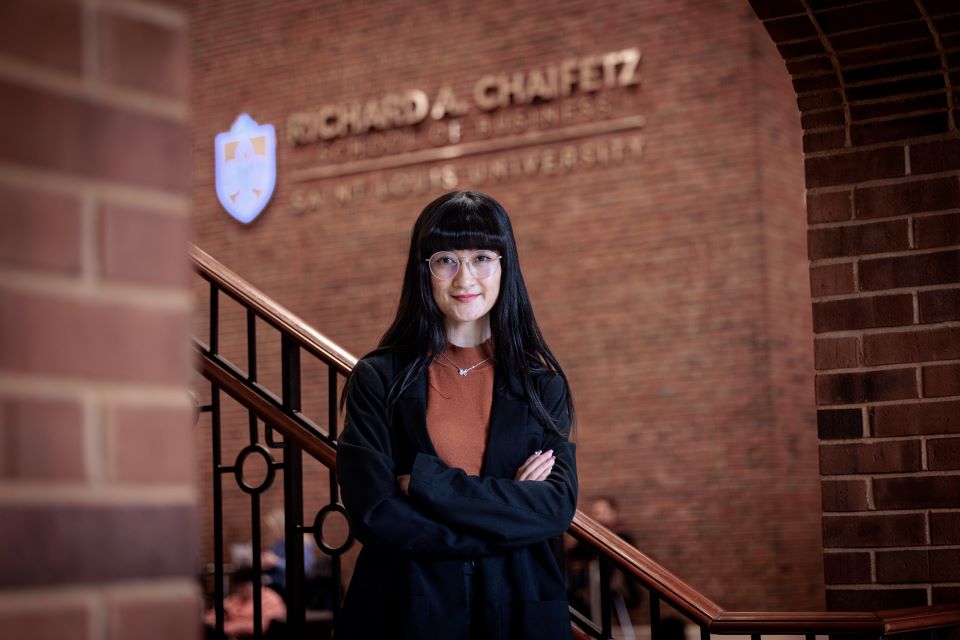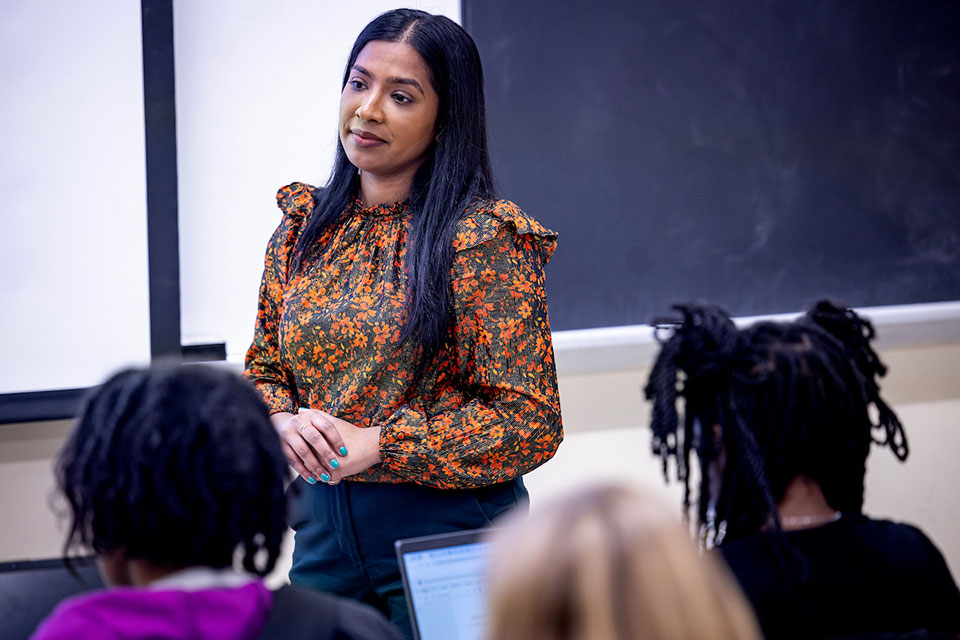Internet of Waste: SLU Researcher Tackles the Recycling Problem with GeoAI and Sensor-Powered Waste and Recycling Bins
An NSF Grant will support a geospatial pilot project in the City of St. Louis
ST. LOUIS – Where does your recycling go? Neighborhoods in the City of St. Louis will soon be able to track their recycling and solid waste thanks to a geospatial sensor developed by a Saint Louis University researcher.

Sensors capture the inside of a waste bin. The sensors are built in the AI-CHESS (Artificial Intelligence for Coupled Human Environment System Analysis for Sustainability) Lab at SLU. Submitted photo
Orhun Aydin, Ph.D., assistant professor in Earth and Atmospheric Science at SLU’s School for Science and Engineering, received a $149,791 planning grant from the National Science Foundation for a program to put sensors in garbage and recycling bins around the City of St. Louis.
The program follows a pilot conducted at Saint Louis University, which allowed the research team to see when and where people dispose of their waste and recyclables.
Aydin said he was inspired to work on fixing environmental issues at the source after spending years in industry working on islands of plastics in the oceans.
“I wasn’t aware of the scale until then. I realized the solution can’t be fixing the islands of waste – we had to cut things off at the tap,” Aydin said. “I want to fix the problem in the city before it reaches the natural environment.”
Solid waste management and recycling is a significant challenge for communities, as only a small fraction of the recyclables collected are recycled. Mismanaged solid waste is routed to landfills and incinerators, most of which are now built in low-income communities and communities of color.

Orhun Aydin, Ph.D.
The project develops an Internet of Things (IoT) system to connect people and communities to the fate of their waste by forming data-driven links between citizens, local government, waste service contractors, and policymakers.
The sensors use chips with IoT infrastructure built in the AI-CHESS (Artificial Intelligence for Coupled Human Environment System Analysis for Sustainability) Lab at SLU. They will be embedded into alley-based waste and recycling bins in multiple neighborhoods around 66 square miles of St. Louis.
“We are starting with 100,” Aydin said. “I hope to get to 10,000 in the next few years and working with the community, the city, and local partners to get there.”
In addition to the sensor network, the project will prototype AI models for optimizing city-wide recycling operations and for quantifying the impact of various recycling outreach on recycling in recycling and waste reduction behavior change.
The sensors will characterize items in the waste bins to determine what is being thrown in which bin and when. The low-cost sensors developed in Aydin’s lab are sensitive enough to determine the chemical composition of incoming waste. The sensors also measure the bacterial activity inside waste bins, which the team is using to assess food degradation to guide future food waste reduction.
The research team is partnering with EarthDay 365, a non-profit whose goal is a more equitable and environmentally sustainable St. Louis region, to design educational programming based on its findings.
“We are partnering with EarthDay 365 on community outreach and working with local residents,” Aydin said. “We will be able to determine what types of outreaches work best in which neighborhoods. Our goal is to keep the recycling rate high without overburdening people.”
The first round of sensors is being placed around several locations in the city, from areas with high recycling rates to areas regularly targeted for illegal dumping.
Aydin said he is excited to work with the city, noting the partnership will also allow the city to see where the waste bins are and what is in them to potentially optimize routes for allocating limited resources effectively.
“This data, from a $5 device, will allow us to see things we couldn’t see before,” he said. “I’m excited about the digital transformation that this IoT network will bring and problem-solving that can come from working together with the city and local community.”
The NSF planning grant will allow Aydin to hone the sensors’ design parameters, identify data gaps that impact waste management operations, and delineate citizens’ expectations of recycling service transparency and form partnerships.
Community outreach will begin in June.
James Tinjum, Ph.D., University of Wisconsin, and Bruce O’Neill, Ph.D., associate professor in Sociology and Anthropology at SLU, serve as co-principal investigators.
National Science Foundation
The National Science Foundation (NSF) is an independent federal agency created by Congress in 1950 to promote the progress of science, advance national health, prosperity, and welfare, and secure national defense. The NSF is the funding source for approximately 25% of the total federal budget for basic research conducted at U.S. colleges and universities.
Saint Louis University
Founded in 1818, Saint Louis University is one of the nation’s oldest and most prestigious Catholic institutions. Rooted in Jesuit values and its pioneering history as the first university west of the Mississippi River, SLU offers more than 15,200 students a rigorous, transformative education of the whole person. At the core of the University’s diverse community of scholars is SLU’s service-focused mission, which challenges and prepares students to make the world a better, more just place.
Latest Newslink
- Saint Louis University Joins Multi-Disciplinary Research Team to Enhance Stress Resilience in SorghumSaint Louis University is part of a multi-disciplinary team, led by the Donald Danforth Plant Science Center, to deepen the understanding of sorghum, a versatile bioenergy crop, and its response to environmental challenges.The U.S. Department of Energy (DOE) Biological and Environmental Research (BER) program supports the three-year $2.5 million project for Genomics-Enabled Understanding and Advancing Knowledge on Plant Gene Function. Saint Louis University will receive $437,039 for its portion of the study.
- SLU Graduates Celebrated at Midyear CommencementSaint Louis University celebrated its Midyear Commencement on Saturday, Dec. 13, inside Chaifetz Arena. More than 1,900 guests watched as 600-plus SLU students walked across the stage and left as graduates.
- Why Do Raccoons Cross the Road? SLU, St. Louis Zoo Research Shows They Don'tA new study led by researchers from Saint Louis University, the Saint Louis Zoo, and partner organizations set out to understand how raccoons use space in one of the nation's largest urban parks.
- Structurally Sound: Two Gingerbread Houses Built by SSE Students Hold Up Under 100-Plus Pounds of WeightTeams of students, faculty and staff in Saint Louis University's School of Science and Engineering recently put their engineering skills to work for a December Innovation Challenge, building gingerbread houses designed to stand up during a weight-loading competition.
- Saint Louis University Student Speaks at Ignatian Family Teach-In for JusticeSaint Louis University senior Sahar Hussaini shared her views on fast consumerism and why she believes in Catholic Ethical Purchasing at the 2025 Ignatian Family Teach-In for Justice. The event, held annually in Washington, D.C., is the nation’s largest Catholic social justice advocacy day.
- SLU Commits up to $1.5 Million to Support Local Students Pursuing Social Work and Criminal Justice CareersThe new initiative — representing a commitment of up to $1.5 million in scholarship support over the next several years — is designed to strengthen the region’s social work and criminal justice workforce by expanding college access for talented local students.













